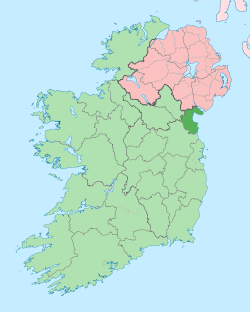Castlebellingham
Castlebellingham (Irish: Baile an Ghearlánaigh) is a village and townland in County Louth, Ireland. The village has become a lot quieter since the construction of the new M1 motorway which bypasses the village. Because of its proximity to Dublin and Dundalk, the village has seen an influx of new inhabitants and construction.
History and Features of Note

The castle of Castlebellingham has served as one of the ancestral homes for Bellinghams since the 17th century. The Bellingham family originated in the small town of Kendal, Westmoreland in England, the original ancestor of the Irish Bellinghams, Alan Bellingham hailed from here.[1]Henry Bellingham, a descendant of Alan was a cavalry officer who first came to Ireland during the English Civil War. The lands of Gernonstown were granted to Henry during the Cromwellian Settlement, in which a large amount of native Irish lands were given to Englishmen in reward for their service. Henry is named in the list of grantees under the Acts of Settlement and Explanation of Charles II s. In 1666, Charles II formally granted the lands to him for his ‘faithful service as a good soldier in the late wars’[2]
There is some variation on the spelling of Gernonstowne. On various maps and other documents it is spelled Gernonstowne, Gernonstown, Gernon's-Town, Gormanstown, Germanstown, Garlandstown, Garland, etc. Irish road signs show the English as Castlebellingham while the Irish translation still refers to baile an Ghearlanaigh - or Gernonstown. It was not called Castlebellingham for at least forty years after the purchase. The name does not appear on any document before the year 1700. About 1710 it began to appear in journals and other sources to be called Castlebellingham.[3]
The castle was occupied by troops and burned down in the autumn of 1689 by King James II in revenge for Colonel Thomas Bellingham being a guide for William III, prior to the Battle of the Boyne.[3] It is said that King William's armies camped the night before the Battle of the Boyne in the grounds of the castle.[4]
Over time Castlebellingham became known as an important gathering point in the county. Fairs were held there every year. A church was constructed next door to the castle and graveyard with a family vault was built. The Bellinghams became one of the most powerful and influential family in the county. For over a hundred years a Bellingham held the seat in Parliament for county Louth.[3]
Records also note Castlebellingham for having "the best malt liquor" in Ireland. Apparently a brewery was built on site about 1770 and belonged to an O'Bryen Bellingham. For a number of years a brewery partnership ran their liquor business.[3] The brewery is still there but now houses the "button factory" or Smallwares Ltd. The brewery was the main supplier of drink to the Boer War troops.
A history of the parish, dated 1908, states that the impressive Calvary standing close to the Castle was erected by Sir Henry Bellingham as a monument to the memory of his first wife Lady Constance.[4] A collection of inset religious panels is to be seen on the upper facades of many of the village buildings. These are also a reflection of Sir Henry's religious sentiments, and they are unique in Ireland. In addition to the many panels, there are biblical quotations cut into the stone window sills of some buildings. North of the castle is a carefully preserved group of "widows dwellings", built from charitable motives by Sir Henry.
Castlebellingham was the ancestral home of the Bellingham baronets until the late 1950s. The last Bellingham to live there was Brigadier General Sir Edward Bellingham, born in 1879, who was the last Lord Lieutenant of Louth in 1921, and Guardian of the Rolls (Custos Rotulorum).[4] He was then elected to the Irish free State Senate in 1925-36. It was purchased by Dermot Meehan in 1958 from the Irish Land Commission for £3,065.00. Meehan spent several years converting the house into the Bellingham Castle Hotel, which remains today. Meehan sold the hotel and 17 acres in 1967 for £30,636.61. The hotel, including the 17 acres, was offered for sale at €1,500,000 in 2011.
In December 2012, it was announced that the Corscadden family, who own and run Cabra Castle Hotel in Kingscourt, Co Cavan and Ballyseede Castle Hotel in Tralee, Co Kerry, purchased Bellingham Castle. They are currently renovating the property and will transform the 19-bedroom castle into an exclusive hotel and wedding venue, to open for business in January 2014.
The town is home to the Gaelic football team the O'Connell's. In 2012, the team had resounding success winning their first Intermediate Championship. After victories over Laois and Meath opposition, they narrowly lost to Monasterevin of Kildare in the Leinster final.
Transport
Castlebellingham railway station opened on 1 April 1851, but finally closed on 6 September 1976.[5]
Castlebellingham motorway service area on the M1 opened on 29 September 2010.
References
- ↑ Boyle, Séan (2004). Looking Forward, Looking Back: Stories, Memories and Musings of Castlebellingham/ Kilsaran/ Stabannon. Dundalk. p. 12.
- ↑ Leslie, James B. (1908 (Reprinted 1986)). History of Kilsaran. Dundalk. p. 46. Check date values in:
|date=(help) - 1 2 3 4 "A brief history and interesting facts about Castlebellingham". Castlebellingham. Retrieved 2007-09-16.
- 1 2 3 "Introduction to Bellingham Castle Hotel". Bellingham Castle Hotel. Retrieved 2007-09-16.
- ↑ "Castlebellingham station" (PDF). Railscot - Irish Railways. Retrieved 2007-09-16.
External links
- Eiretrains - Castlebellingham Station
- Bellingham Castle
- O'Connell's GFC website
- TripAdvisor - Bellingham Castle
See also
Coordinates: 53°54′N 6°23′W / 53.900°N 6.383°W
